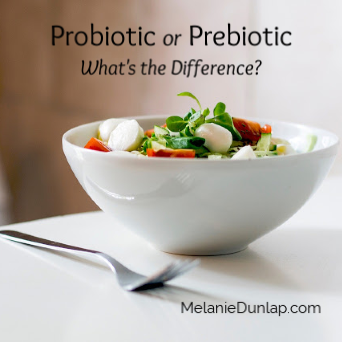Keeping a healthy digestive system can sometimes seem overwhelming. Eat this for one part, eat that for another. Make sure the cultures are live and you get enough fiber.
An adult digestive system is about 30 feel long and has a range of pH from 1.5 to 7.0 and six hollow organs. It is a delicate balance to keep all that in proper working order.
Probiotics and prebiotics can be a part of maintaining that balance. Prebiotics are food for probiotics but not until they get to the colon which is at the end. And in some cases, prebiotics can make things worse.
Here’s what you should know:
Probiotics
Probiotics are live bacteria and yeasts that benefit the body. Your body is full of bacteria, some we call “good” and some “bad”. We give them those names because of how they make our body function and feel.
Probiotics are considered good bacteria.
They are good because they benefit the digestive system and help keep the bad bacteria in check. A large population of good bacteria takes up so much space that there isn’t enough room left for bad bacteria. Smart.
When things are running perfectly in the body it doesn’t need the addition of food and supplements containing probiotics. After all, it’s running perfectly.
But most of us aren’t perfect. We’re stressed out, eating on the run and skipping workouts. That takes a toll on the bacteria in our gut.
Adding probiotics can support the “good bacteria” that are already in there.
Another danger to our good bacteria is antibiotics. The exact opposite of probiotics, antibiotics are strong medicines used to destroy or slow down the growth of bacteria. And they don’t discriminate. Antibiotics destroy both good and bad bacteria.
Probiotics can help replace the good bacteria that are lost from a course of antibiotics.
You probably already know that yogurt is a good source of probiotics. It is the most well-known food product containing them. Inside your body are many strains of the bacteria Lactobacillus and Bifobacterium. The probiotic found in most yogurt is Lactobacillus acidophilus. When choosing a yogurt, make sure it contains “live” cultures.
Here are some other foods that can contain probiotics:
- Some juices and soy drinks
- Buttermilk
- Some soft cheeses
- Miso
- Tempeh
- Kefir
- Kimchi
- Sauerkraut
- Pickles
Probiotics are useful in supporting overall health of the gastrointestinal tract as well as helping to support our immune system and the health of other body systems.
Prebiotics
The concept of a prebiotic wasn’t introduced until 1995 when Glenn Gibson and Marcel Roberfroid defined it as “a nondigestible food ingredient that beneficially affects the host by selectively stimulating the growth and/or activity of one or a limited number of bacteria in the colon, and this improves host health”.
That means prebiotics are dietary fibers that avoid absorption until they reach the colon. These types of fibers are resistant to hydrochloric acid and enzymes, so they reach the colon undigested.
In the colon fiber is broken down by Bifidobacterium microbes, causing a fermentation process. The fermentation creates short-chain fatty acids, which provide energy for the cells lining the colon. Healthy fermentation in the colon is believed to protect against colon cancer.
There are other potential health benefits to prebiotics:
- Adds bulk to your stool, which stimulates the bowels to move and propel your stool forward
- Increases absorption of minerals such as calcium, selenium and magnesium
- Makes you feel full which can contribute to weight management
But prebiotics are not appropriate for everyone. They can worsen symptoms of Irritable Bowel Syndrome (IBS) and Small Intestinal Bacterial Overgrowth (SIBO) because fermentation can cause gas bloating, diarrhea or constipation in people who are sensitive.
Try to get your prebiotics from whole foods so you get the additional vitamins, minerals and antioxidants.
You’ll get prebiotics in many fruits, vegetables and whole grains:
- Artichokes
- Asparagus
- Bananas
- Barley
- Chicory
- Garlic
- Green vegetables
- Legumes (peas and beans)
- Oats
- Onions
- Wheat
There is still more to learn in the area of prebiotics. Ongoing research is helping us to better understand their role in the health of our digestive system.
It may seem overwhelming at first, but having good gut health starts with making good choices and eating wholesome foods. The more natural the food, the more balanced the gut microbiome. Working with a wellness coach can put you on the right track for your unique body.
If you want better digestive health and a stronger immune system, click here to schedule a free discovery call with Dr. Melanie.
